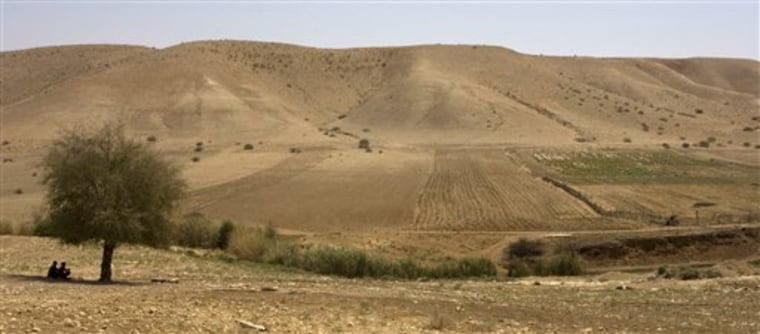The Jordan Valley, a tranquil stretch of West Bank desert dotted with date palms, Jewish settlements and Palestinian hamlets, is joining the already formidable list of potential obstacles to Mideast peace.
The strategic strip of land abutting Jordan would be an essential part of a future Palestinian state. But Israeli Prime Minister Benjamin Netanyahu — adopting a harder line than his predecessors — wants to keep Israeli forces there permanently to keep out weapons and block any Arab invasion from the east. He recently sought U.S. support for this demand as part of the wrangling over resuming negotiations with the Palestinians.
The Palestinians say they can't give up an inch of the fertile valley, which makes up a quarter of the West Bank and would be one of the few largely undeveloped territories of their crowded future state, a place to build new cities and settle refugees.
With an eye to the future, Palestinian Prime Minister Salam Fayyad broke ground Monday on an agroindustrial park in the valley that, with funding and technical help from Japan, is to create 10,000 Palestinian jobs one day and transform the sleepy area into an economic hub.
"We are trying to do the best we can, with the help of the international community, to create positive facts on the ground," Fayyad said after planting a tree on a desert plot south of Jericho, where 35 factories, including canneries and small manufacturers, are to start production by the end of 2012.
Starting on the $30 million project is a huge gamble, though, because after four years of negotiations, Israel has yet to issue key permits, such as permission to link the park's access road to a nearby highway leading to the Jordanian border, Palestinian officials say.
Israeli officials said they support the project and are doing what they can to advance it.
The haggling over the Jericho park highlights the broader struggle over the Jordan Valley, captured by Israel along with the rest of the West Bank, the Gaza Strip and east Jerusalem in the 1967 Mideast War.
Israel's traditional security doctrine holds that Israel — at its narrowest only nine miles (13 kilometer) wide — needs to control a buffer zone between the West Bank and Jordan to shield against attack by Arab armies.
In an apparent attempt to keep Israel's options open, Israel has curtailed Palestinian development in the Jordan Valley since 1967.
Nearly all of the territory — home to some 56,000 Palestinians and 9,000 Jewish settlers — is under full Israeli control. By contrast, the vast majority of the West Bank's 2.5 million Palestinians live in areas where they have some say over their civil affairs.
In inconclusive Mideast peace talks a decade ago, Israeli and Palestinian negotiators reached tentative agreement on setting up two or three Israeli-manned early warning stations in the valley, said former Israeli negotiator Shaul Arieli. However, Netanyahu is believed to want a much stronger presence.
Since accepting the idea of Palestinian statehood last year, Netanyahu has repeatedly said Israel must maintain a long-term presence in the Jordan Valley to ensure it is demilitarized.
This would involve stationing a large numbers of Israeli troops there, said an Israeli official who spoke on condition of anonymity because he was not permitted to discuss the issue with reporters.
In recent weeks, Netanyahu raised the issue of a continued Israeli troop presence with U.S. officials, who were trying to persuade him to extend a 10-month-old curb on West Bank settlement construction, the Israeli official said.
The Obama administration has offered diplomatic and security assurances to Netanyahu in exchange for extending the settlement curb, Israeli and Palestinian officials have said.
Among other things, the U.S. expressed support for Israel's need to prevent weapons smuggling and offered help with special arrangements for Jordan Valley security, according to David Makovsky, an analyst writing last month on the website of the Washington Institute for Near East Policy. U.S. officials would not confirm any assurances on the Jordan Valley.
The Palestinians adamantly reject the notion of Israeli troops in a future Palestinian state, though President Mahmoud Abbas has said he would allow NATO forces to keep the peace.
With Israeli-Palestinian talks stalled and statehood a distant dream, the Palestinians' more immediate concern is to stake a claim to the valley, about a quarter the size of Delaware.
This week, the valley's main Palestinian town, Jericho, celebrated its 10,000th birthday, giving Fayyad a platform to cut ribbons for foreign-funded projects, including a new road, in the presence of the French and Spanish foreign ministers and Japanese diplomats.
Fayyad, an economist who has launched an ambitious development plan to prepare the Palestinians for independence, said he also hopes to set up an international airport in the area, though that is an uphill battle.
"Israel's capricious control regime has limited very much the scope for development in the very important part of our country," he said.
The park's future is also uncertain because Israel has failed to issue key permits.
Mohammed Thekri, a Palestinian engineer involved in the project, said developers decided to go ahead with the first phase in hopes of forcing Israel's hand. "If we do nothing, until we get approval from the Israelis, it maybe will take another 10 years," he said.
___
Associated Press writers Aisha Mohammed in Jerusalem and Dalia Nammari in Ramallah contributed to this report.
